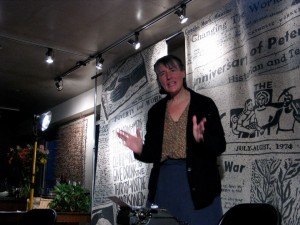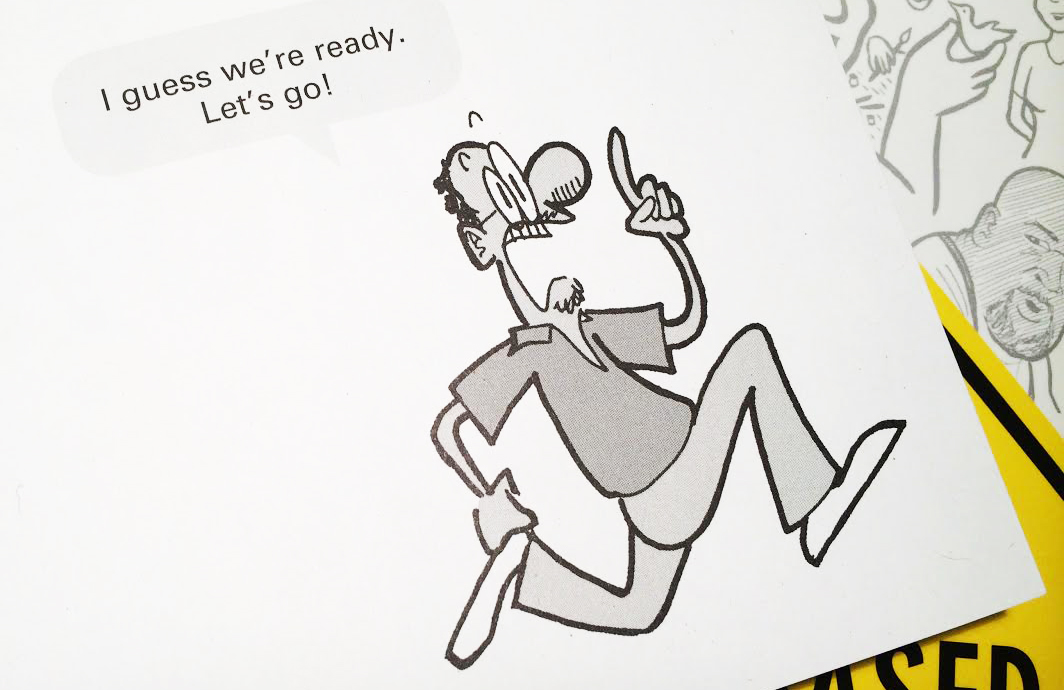Still Point Theatre Collective, based out of Chicago, works to “celebrate our common spirituality, and raise consciousness on issues of peace and justice” through professional shows and workshops. I spoke with Still Point Founding Director Lisa Wagner-Carollo, who shared her thoughts on the organization’s work, and the connections between theater, social justice, and spirituality.

Why don’t you start by telling me a little about Still
Point?
We’re a theater company that’s focused on
spirituality and social justice. We express that through touring shows
focused on those topics, and also we run outreach programs. We work in three
different institutions with incarcerated women, helping them to write and
perform their own plays. We also have a theater troupe made up of women who
have been released from prison, called Sisters Rising. And we do seven
theater and writing workshops with adults who are developmentally disabled.
How did you get started?
I had felt I wanted to do this
kind of work for a very long time. I wanted to be an actress since I was
about five years old. Then when I was about fifteen I had a very deep
spiritual experience and thought of going into ministry. Then when I went to
college I was very drawn towards social justice. So when I got out of
college I knew I wanted to combine those three things: theater, spirituality
and social justice.
I had just left a company here in Chicago focused on these issues, and I was asked to tour Haunted by God, my one-person show on Dorothy Day in Europe. I knew I needed some kind of producing entity to be able to put the show up again, so I started Still Point. But even from the very beginning of the company I had an eye on not only doing plays to raise consciousness, but also doing work in our own community. I felt our integrity was at stake; It didn’t make sense to me to raise people’s consciousness but not doing anything ourselves here in Chicago.
I had been doing theater at Esperanza Community Services with adults with developmental disabilities even before Still Point began, so when Still Point started that program was absorbed into the work. Then in 1998 I felt drawn to start a program at the Metropolitan Correctional Center doing theater with incarcerated women. Year by year things have just been growing and blossoming into the full programs that we have now.
How did you pick the name Still Point?
I heard a talk
during the time I was starting the company in which this speaker talked
about the “still point” in each person where the divine lives that cannot be
violated. I was really struck by that. I knew that was what I wanted my
focus to be, instead of being burnt out and working too hard. So I named the
company Still Point as a reminder. Right now as I say this to you I’m being
reminded once again. I always tell people I didn’t want to name the company
the “Freaked-Out-And-Burned-Out Theatre Collective” (laughs). But other
people may interpret the name differently, and that’s great.

What are Still Point’s goals as a company?
I would have
to go program by program, really.
All right. What about the goals of the touring
shows?
Well, for example, I do a one-person show on the life
of Dorothy Day. I believe the goal of that play is to show people what one
person can do with her life, and encourage people in their own journeys —
and also to hopefully inspire people to want to lift up others, people who
are homeless or hungry. I know that that the play has inspired the starting
of a couple of catholic worker houses, and to me that’s the ultimate
satisfaction.
And the work with incarcerated women? What do you
hope comes out of that?
We really hope that these workshops
help to build self-esteem in the women, and empower them to see themselves
differently. It’s been my experience that most of the incarcerated women I
meet were the victims of crime long before they ever committed a crime, and
many of them have just tried to survive most of their lives. I hope that our
workshops can help the women to get beyond merely surviving, and really give
them a sense of thriving: to experience their own creativity.
We always lead up to a performance, and that’s very important because it helps the women to focus on a goal and to achieve that goal. There was a woman who came up to me after a show and said, “Thank you for giving me hope.” She said, “You know, I’ve never achieved anything in my life. Whenever I start something I don’t finish it. I quit. I get scared. But I came to your workshop, I came every week, I was dedicated, I wrote that poem, I got up on stage and performed that poem in front of all those people, and I didn’t fail. Now I really have some hope that when I get out I can go back to school, and accomplish what I want to.”
Then on another level we hope the class builds community, and gives the women
an opportunity to relax and laugh and experience something meaningful. One
of the classes I’m working with now are just so talented at improvisational
theater, and they just crack each other up. They will spend an hour just
laughing hysterically at the work that their classmates are doing. And many
of them will just look at me and sigh and say, “Oh, I just wait for this all
week to come here and to laugh.
Then part of the class is focused on
writing and the women just shine through it. They write about things that
are important to them and they hear each other and realize how much they
have in common, and they can feel less alone.
Our projects with adults with developmental disabilities definitely build self-esteem. But also, for me, doing the theater with adults with disabilities is a justice issue. Many of the adults I meet in that community are gifted artists, but often don’t have a chance to express themselves through the arts. So it’s a justice issue to give them a voice and a forum to express themselves, where they can talk about things that are important to them, and can grow as artists.
In your work, why and how have you made connections between theater
and justice?
On a personal note, I knew that I would not be
happy or satisfied doing theater that was not focused on social justice. But
also, in theater you’re right there, face to face with people. When we do a
play at the prison the warden is sitting there watching the show, and the
inmates are performing about their lives, and they are face to face. It’s
flesh and blood, and often there is a discussion afterwards. I believe that
social justice, social change, is not about issues, it’s about people. And
in theater people are living and breathing in front of each other, talking,
being disturbed by the play and being disturbed by each other. And it’s not
always comfortable. But I believe that the theater makes an excellent forum
for those kinds of confrontations that hopefully lead to healing and change.
One of the strands of cultural organizing is about embedding
organizing in the rituals, values, and visions of different religious
traditions. Could you talk about how spirituality plays a role in
working for justice in your life and in Still Point?
When I
started Still Point I had a vision to combine spirituality with social
justice and theater, so for me I couldn’t really separate those three
things. But people come here who have no spiritual focus, while other people
have a designated path that they are on. We really welcome everyone. That’s
the kind of spirituality I wanted to focus on, something that’s a lot more
wide open. To be honest, through the last eighteen years of Still Point,
without my spirituality I would not have been able to survive. (laughs)
Why is that?
Because it’s so hard. I find that my
spiritual focus gives me so much strength and really helps me to be
empowered through the day-to-day. There are days where I feel completely
drained, yet the spiritual focus helps me to look beyond what’s happening
that day — this horrible email I just received or the fact that I have to
raise $10,000 dollars — and focus on things that are more eternal.
As far as the workshops, I’ve never had an evangelizing perspective. I heard someone say once that you don’t take Christ to people, you go and discover the Christ that’s already there. When I go to the state prison, many of the women are very focused on their spiritual lives. I don’t come in and say that we are going to talk about god or the divine, but they invariably want to bring their spiritual life to their writing. They bring it, and through bringing in their own spiritual life, they encourage me.
For more on Still Point, visit: http://www.stillpointtheatrecollective.org/

